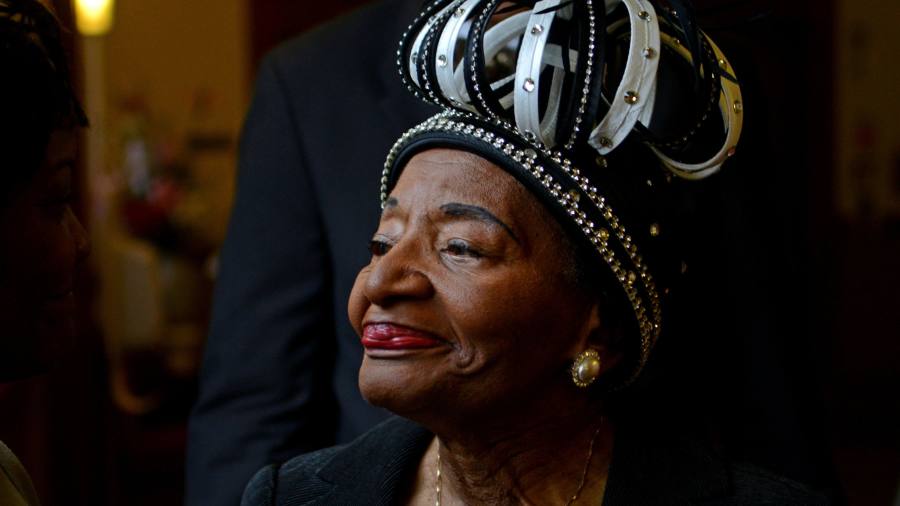Receive free Christine King Farris updates
We’ll send you a myFT Daily Digest email rounding up the latest Christine King Farris news every morning.
Martin Luther King Jr attributed many of the philosophies behind his civil rights campaign to his Christian faith. But King credited the genesis of that faith to his older sister, Christine King Farris.
When they were children, a speaker at the family’s church invited anyone who was interested to formally join it. Farris accepted, and King followed.
In a 1950 essay, composed while he was studying at Crozer Theological Seminary in Pennsylvania, he wrote: “From this it seems quite clear that I joined the church not out of any dynamic conviction, but out of a childhood desire to keep up with my sister.”
Farris, who has died aged 95, became a champion of her brother’s legacy. During his life, she attended several of his marches for the civil rights of black Americans. After his assassination in 1968, she co-founded the educational non-profit King Center for Nonviolent Social Change alongside her sister-in-law, Coretta Scott King. She consulted on the creation of the museum of the King family home in Atlanta, in addition to a 48-year career as a tenured professor of education at Spelman College.
Farris was born in 1927 into a middle-class family in Atlanta. She was the oldest child of Martin Luther King Sr, a Baptist preacher, and Alberta Williams, a teacher. King was born 16 months after Farris. Their younger brother, Alfred Daniel King, was born in 1930.
At the time, Atlanta was racially segregated. Farris dreamt of attending the University of Georgia but could not because the school did not admit black students until 1961.
“She defied the odds that held back too many marginalised communities — going on to become a civil rights leader and acclaimed author,” Martin Luther King III, her nephew, wrote on Twitter.
Farris earned a bachelor’s degree in economics from the historically black Spelman College and, later, two masters degrees in education from Columbia University. She taught at a public elementary school that served low-income black students before returning to Spelman in 1958.
In 1960, Farris married Isaac Newton Farris. Her brothers officiated the ceremony. The couple had two children: Isaac Newton Farris Jr and Angela Christine Farris Watkins.
She remained active in Ebenezer Baptist Church, where King, in addition to Farris’s father and grandfather, preached. She was the church’s longest-serving member.
Raphael Warnock, the Democratic senator from Georgia and Farris’s pastor, said she was “an iteration of the American dream . . . She went on to witness the long arc of American history bend from many changes, much of it pushed forward by her own brother.”
In her activism, Farris said her goal was to humanise the memory of her brother. “They think he simply happened, that he appeared fully formed, without context, ready to change the world,” Farris wrote. “Take it from his big sister, that’s simply not the case.”
She told CNN in 2008 that, as a child, King loved playing pool and telling jokes. Other boys called him “Tweed” after the fabric of his favourite suit. As a young adult, King borrowed money from Farris to buy an engagement ring for then-girlfriend Coretta Scott.
Farris was also a far better student than King, who struggled with grammar and spelling, according to historian Taylor Branch, author of a Pulitzer Prize-winning biography of King. Farris wrote several books about her experience growing up and protesting with King.
She also endured several personal tragedies. She was sewing an Easter dress for her daughter and watching the evening news when a broadcaster announced that King had been shot at a motel in Memphis.
“It was a horrible moment,” Farris told CNN. “I tried to call my sister-in-law; the lines were busy. I tried to call my parents; the lines were busy. I couldn’t get anybody.”
She learnt of King’s death while boarding a flight to Memphis. She would never return to “Bluff City”.
The next summer, her younger brother, also a Baptist minister and civil rights activist, drowned accidentally in his own pool. Then, in 1974, Farris’s mother, Alberta King, was shot while playing the organ at Ebenezer Baptist Church.
Yet Farris rejected whispers that the King family was cursed with untimely deaths. Instead, she focused her attention on preserving their memories, often working more privately than her younger relatives. As she told CNN: “By being the lone survivor, if I don’t do this, a part of history will be left out.”
Read the full article here




